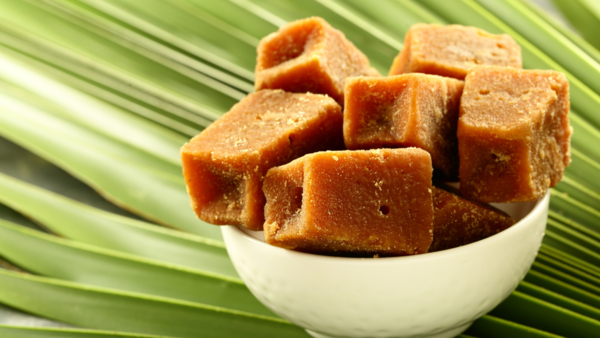The excitement of consuming various superfoods also comes with the arrival of winter! Gud or jaggery is one among them. For good reason, our grandparents used it for refined sugar while making chutneys, chikkis, and laddoos. They even added it to hot beverages. Gud pairs nicely with sarson da saag, makki ki roti, and other spicy treats, but it can also be eaten on its own! However, what is jaggery exactly, and why is it popular at this time of year? For centuries, Indians have utilized jaggery, an unprocessed sugarcane or palm juice. During the winter, you should stock up on it for the following reasons:
Nutrient profile of Jaggery
Since gud is sweet, it contains 375 calories per 100 grams. Here’s the nutrient profile of 100 g jaggery:
Iron: 11 mg, or 61% DV
Vitamin E: 111.30 mg, or 740% DV
Vitamin A: 3.8 mg, or 422% DV
Vitamin C: 7.0 mg, or 7.8% DV
Protein: 280 milligrams (mg), or 5.6% daily value (DV)
Magnesium: 70–90 mg, or approximately 19% DV
Calcium: 40–100 mg, or approximately 5% DV
Potassium: 1056mg, or 22.5% DV
Manganese: 0.2–0.5 mg, or approximately 15% DV
Phosphorus: 20-90 mg, or approximately 5% DV
Sucrose: 65–85 g
Fructose and glucose: 10–15 g
Benefits of having jaggery:
Keeps you energetic
Since jaggery contains longer chains of sucrose than sugar, it takes longer to digest and releases energy gradually rather than instantly, giving your body more opportunity to use it for good purposes. Gur is perfect for winters because it is known to generate heat and provide the body with immediate energy.
Increases iron in blood
Feelings of weakness and exhaustion are symptoms of anemia, a disorder brought on by a lack of red blood cells or hemoglobin. Iron, a necessary mineral that is essential for the blood’s oxygen transport, is found in jaggery. Jaggery helps to maintain adequate oxygen levels in the body and promotes general lung function by preventing anemia.
Controls blood pressure
People with high blood pressure may benefit from jaggery’s ability to widen blood vessels. The inability to force blood through the arteries is a hallmark of hypertension. Artery dilatation lowers blood pressure by facilitating easier blood flow.
Prevents sickness
Our ancient knowledge has always advised taking jaggery often, especially in the winter, to strengthen one’s immunity against recurrent illnesses like the common cold, sneezing, allergic responses, etc. “The different components in jaggery, particularly zinc and selenium, protect you from oxidative stress and recurring infections, which are quite harmful to our bodies. Jaggery’s selenium can help stop the negative effects of free radicals. Generally speaking, it helps protect your body from a variety of ailments.
Detoxifies lungs and liver
Jaggery helps purify the lungs, which is beneficial for people who live in places with heavy air pollution. Including jaggery in one’s diet can also help those with pneumonia, bronchitis, and asthma. Jaggery is very important for liver detoxification. It has a high zinc and selenium content and is utilized in Ayurveda as a blood purifier and liver detoxifier.
Nolen Gur: Traditional winter cuisine of Bengal that will trigger your taste buds
I’m Manas Ranjan Sahoo: Founder of “Webtirety Software”. I’m a Full-time Software Professional and an aspiring entrepreneur, dedicated to growing this platform as large as possible. I love to Write Blogs on Software, Mobile applications, Web Technology, eCommerce, SEO, and about My experience with Life.




